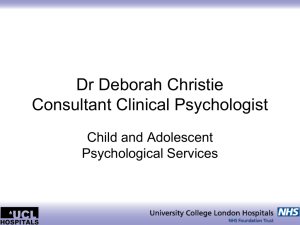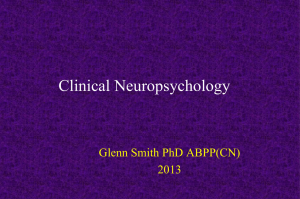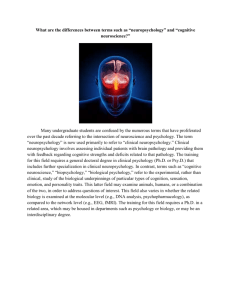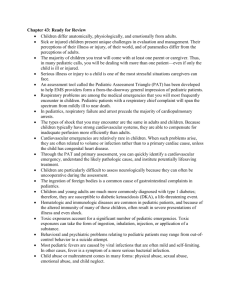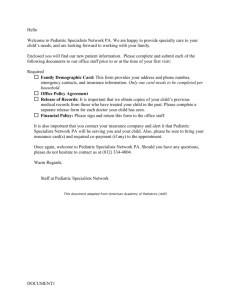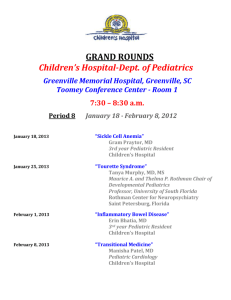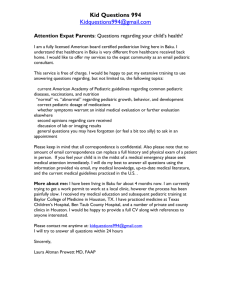Pediatric Neurology History Form
advertisement
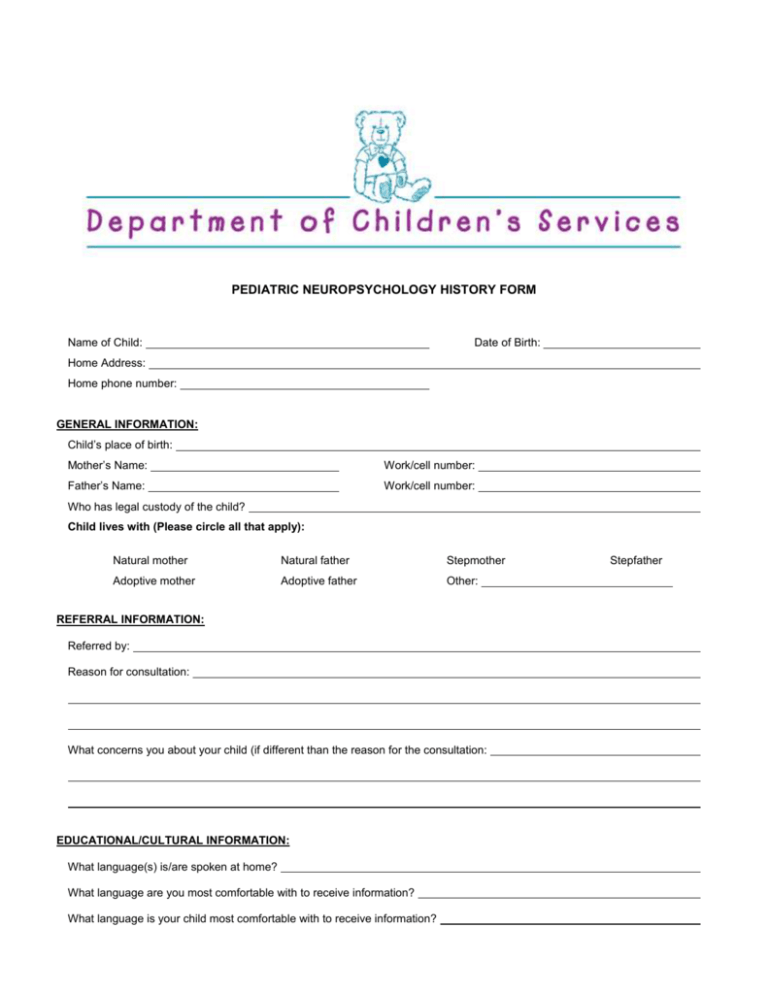
PEDIATRIC NEUROPSYCHOLOGY HISTORY FORM Name of Child: Date of Birth: Home Address: Home phone number: GENERAL INFORMATION: Child’s place of birth: Mother’s Name: Work/cell number: Father’s Name: Work/cell number: Who has legal custody of the child? Child lives with (Please circle all that apply): Natural mother Natural father Stepmother Adoptive mother Adoptive father Other: REFERRAL INFORMATION: Referred by: Reason for consultation: What concerns you about your child (if different than the reason for the consultation: EDUCATIONAL/CULTURAL INFORMATION: What language(s) is/are spoken at home? What language are you most comfortable with to receive information? What language is your child most comfortable with to receive information? Stepfather Pediatric Neuropsychology History Form Page 2 In what ways do you feel you would best be able to learn about your child’s treatment? (Check all that apply) □ Demonstration □ Instruction with Return Demonstration □ Verbal Information □ Written Information □ Other: Do you have any religious or cultural needs related to you child’s care to which we need to be aware? (i.e. diet, religious practices) □ Yes (if yes, please explain below) □ No PREGNANCY/BIRTH HISTORY: Is this child adopted? Y Was the child born on time? N Y N; if no: Child’s birth weight: weeks early/ Regular Nursery weeks late OR Intensive Care Nursery (circle one) Age of the mother at time of delivery: Type of delivery: Vaginal Caesarean Induced If caesarean or induced, please indicate reason: Did any of the following occur? □ Breathing problems □ Breach birth □ Cord around the neck □ Hemorrhage □ Injury to baby □ Fetal distress Were you given any drugs to easy the pain during labor? □ Forceps required □ Yellow in color (jaundice) □ Blue in color Y N (If yes, which drug: During the pregnancy, did any of the following occur (please circle all that apply): □ Anemia □ Threatened miscarriage □ High blood pressure □ Blood loss or staining □ RH Incompatibility □ Toxemia □ High blood sugar/diabetes □ Other illness (specify): □ Cigarette Use (specify): □ Alcohol use (beyond occasional drink): □ Hospitalization required (specify): □ Operations (specify): □ Infections (specify): □ Other illness (specify): POST NATAL AND INFANCY HISTORY: Number of days in the hospital At birth, this baby received (please indicate): □ Oxygen □ Transfusions D:\106741038.doc # of days: # of days: □ Respirator □ Phototherapy (lights) # of days: # of days: ) Pediatric Neuropsychology History Form Page 3 □ Resuscitation □ Other complications while the baby was still in the hospital: TEMPERAMENT: Was the child an easy baby meaning did he/she cry a lot? Did she follow a schedule fairly well? □ Very Easy □ Easy □ Average □ Difficult □ Very difficult How did he/she behave with other people? □ More sociable than average □ Average sociability □ More unsociable than average When he/she wanted something, how insistent was he/she? □ Very insistent □ Pretty Insistent □ Average □ Not very insistent □ Not insistent at all □ Less Active □ Not active How would you rate the activity level of the child as an infant/toddler? □ Very active □ Active □ Average DEVELOPMENTAL HISTORY: Please indicate the age at which your child did the following: Roll over Sit alone Crawl First words Two word phrases Sentences Button & zipper clothes Tie shoe laces Walk alone Alternate feet while ascending stairs Ride a tricycle Ride a bicycle without training wheels Toilet trained Accidents?: (circle one – if any) bowel/urine day/night Does your child have any difficulty performing age appropriate activities listed below? (Please check all that apply) □ Bathing □ Climbing Stairs □ Communicating □ Dressing □ Social Interacting □ Reaching □ Running □ Sitting □ Sleeping HANDEDNESS: Which hand does your child prefer for writing? □ Right Hand □ Left Hand □ Either/No Preference Which hand does your child prefer for throwing a ball? □ Right Hand □ Left Hand □ Either/No Preference Which hand does your child prefer for kicking a ball? D:\106741038.doc □ Toileting □ Using utensils □ Walking □ Feeding themselves Pediatric Neuropsychology History Form □ Right Hand Page 4 □ Left Hand □ Either/No Preference MEDICAL HISTORY: Allergies: Y N Please list: Does your child have a diagnosis: Y N Please list Is your child currently on any medication? Y N _____________ Please list: ____________________________________________________________________________________________________ Other history (please check all that apply): □ Frequent ear infections □ Ever unconscious □ Stitches □ Headaches □ Scarlet fever □ Pneumonia □ Tubes in ears □ Head injuries/concussions □ Eye glasses □ Stomach aches □ Mumps □ Lead Poisoning □ Tonsils/adenoids removed? □ Fractures □ Any difficulty hearing □ Staring spells □ Chicken Pox □ Encephalitis □ Pain □ Colic □ Failure to thrive □ Broken bones □ Measles Age at each hospitalization: Date of first seizure: Has your child been involved in any serious accidents? Are your child’s immunizations up to date? Has your child ever had a head injury requiring medical attention? If yes, was there loss of consciousness (blackout)? What tests or procedures were performed? At what age did this occur? Did you notice any long standing problems after the injury? If yes, please describe: Describe other Medical conditions/problems not listed above: ____________________________________________________ Is your child being seen by any doctor/medical personnel other than a pediatrician/family practitioner? (if yes, please check all that apply): □ Neurosurgeon □ Physical Therapist □ Dentist □ Neurologist □ Psychologist/Psychiatrist □ Rheumatologist □ Ear, Nose & Throat □ Occupational Therapist □ Speech Therapist □ Other: □ For what reason do you see the above practitioner? _______________________________________________ D:\106741038.doc Pediatric Neuropsychology History Form Page 5 Please answer the following: How is your child’s hearing? How is your child’s vision? How are your child’s gross motor skills? How is your child’s fine motor coordination? How is your child’s speech articulation? □ Good □ Fair □ Poor □ Good □ Fair □ Poor □ Good □ Fair □ Poor □ Good □ Fair □ Poor □ Good □ Fair □ Poor □ Yes □ No □ Yes □ No □ Yes □ No Is there any suspicion of alcohol or drug use? Is there any history of sexual abuse? Has your child had any chronic health problems (e.g. asthma, diabetes, heart condition)? List all chronic illnesses your child suffers from _______________________________________________________________ ____________________________________________________________________________________________________ At what age was the onset of any chronic illness? EDUCATIONAL HISTORY: Please summarize you child’s progress (e.g. academic, social, and testing) within each of these grade levels: Preschool: Kindergarten: Grades 1-3: Grades 4-6: Grades 7-12: What school does your child attend? What grade is your child currently in? Has your child ever been evaluated by a child study team? Does your child have a 504 plan in place? Y Y N N When? Does your child have an IEP? Y N Has your child ever been in and type of special education program, and if so, how long? □ Learning disabilities class (duration ) □ Basic Skills (duration □ Behavioral/emotional disorders class (duration ) □ Other (please specify: ) (duration ) Does your child receive any services in school? (Please check all that apply) □ Occupational Therapy □ Speech Therapy □ Physical Therapy □ Other: Has your child ever been suspended from school? Y N # of suspensions? Has your child ever been expelled from school? Y N # of expulsions? D:\106741038.doc □ Resource room (duration ) ) Pediatric Neuropsychology History Form Page 6 Has your child ever been retained in a grade? Y N # of retentions? Have any additional instructional modifications been attempted? □ None □ Daily/weekly report card □ Behavior modification program □ Other (specify: ) EVALUATIONS & TREATMENT HISTORY: Has your child ever been prescribed any of the following? Please list duration in months next to medication. □ Ritalin (duration ) □ Tranquilizers (duration ) □ Dexedrine (duration ) □ Anticonvulsants (duration ) □ Cylert (duration ) □ Antihistamines (duration ) □ Other prescription drugs – specify (duration ) □ List adverse reactions to drugs (if any): Has your child ever had any of the following forms of psychological treatment? Please list duration next to the treatment. □ Individual psychotherapy □ Group psychotherapy □ Family therapy with child (duration (duration (duration ) □ Inpatient evaluation/Rx ) ) □ Residential treatment (duration of inpatient stay ) (duration of placement ) Please list the start date and current frequency for the following (if applicable): Physical Therapy: Speech Therapy: times per week times per week Occupational Therapy: times per week Counseling: times per month Please list the dates and results for the following (if applicable): Child study team: Does child attend resource room? Y EEG: CT scan or MRI: N Receive basic skills? Y N Other evaluations: FAMILY HISTORY: Parents’ marital status (circle one): Married Separated Divorced Living Together Other_________________________________________________ Mother: Occupation: Personal History: Please check any that apply: □ Seizures □ Difficulty with Math □ Depression □ □ Spelling difficulty D:\106741038.doc □ Headaches □ Reading Problems □ Anxiety □ Highest grade completed in school: □ Speech problems in childhood □ Spelling Difficulty □ Bipolar Disorder □ Pediatric Neuropsychology History Form Page 7 Other Medical Conditions:_________________________________________________________________________ Name of mother’s parents, sisters, brothers, nieces, and nephews with problems similar to your child: Father: Occupation: Personal History: Please check any that apply: □ Seizures □ Difficulty with Math □ Learning Problems □ Headaches □ Reading Problems □ Speech problem in childhood □ Spelling Difficulty □ Attention Problems Highest grade completed in school: Other Medical Conditions:_____________________________________________________________________________ Name of mother’s parents, sisters, brothers, nieces, and nephews with problems similar to your child: ____ ____ Please list your child’s siblings: Name Age Medications (if any) School/grade 1. 2. 3. 4. 5. SOCIAL HISTORY: Where does your child live? House Does any one in the household(s) smoke? Y Apartment N Please list below the names and ages of all individuals living in the household: Name Who is the primary caretaker(s) for your child? D:\106741038.doc Age Other Pediatric Neuropsychology History Form Page 8 Does the place where you child lives have any of the following? (Please check all that apply): □ Elevator □ Stairs, no rail □ Ramp □ Stairs, rail □ Other obstacles: Does your child utilize any of the following specialized equipment? (Please check all that apply): □ Bath chair □ Hearing aid □ Walker □ Cane □ Specialized stroller □ Wheelchair: (circle one) □ Crutches □ Stander Manual or Power □ Other: Is your child involved in any community activities? If yes, please list below: □ Clubs: □ Sports: □ Other: Does your child receive any special services? If yes, please list below: Does your child use a car/booster seat? (for children under 80 lbs.) Y N Does your child use a seatbelt? (for children over 80 lbs.) Y N CURRENT BEHAVIORAL CONCERNS: □ Hyperactive? □ Could be taken to public places without difficulty at ages 3, 4, 5? □ Does child attend preschool? □ Any problems? □ Chores assigned? □ Does chores without being asked? □ Needs reminders? □ Difficulty making friends? □ Difficulty keeping friends? □ Difficulty falling asleep? □ Difficulty staying asleep? □ Snores? □ Difficult to awaken in the morning? □ Takes naps? If yes, at what age? □ Gets ready for school in the morning without supervision? □ Needs an adult to be present? Average time spent on homework Teacher suggested time for homework Please list all grades that were repeated: Grade in which school difficulty first arose?: Does your child have any health problems that could impact on services? Is there any significant family history that could impact on your child’s services? Primary concerns D:\106741038.doc Other (related) concerns Pediatric Neuropsychology History Form Page 9 What strategies have been implemented to address these problems? □ Verbal reprimands □ Physical punishment □ Time out (isolation) □ Acquiescence to child □ Removal of privileges □ Avoidance of child □ Rewards On the average, what percentage of the time does your child comply with initial commands? □ 0-20% □ 60-80% □ 20-40% □ 80-100% □ 40-60% To what extent are you and your spouse consistent with respect to disciplinary strategies? □ Most of the time □ Some of the time □ None of the time Have any of the following “stress events” occurred within the past 12 months? □ Parents divorced/separated □ Parent changed job □ Family financial problems □ Family accident/illness □ Changed schools □ Other (specify): □ Death in the family □ Family moved Which of the following are considered to be a problem for your child? □ Fidgets □ Difficulty awaiting turn □ Shifts from one activity to another □ Often interrupts or intrudes on others □ Often engages in physically dangerous activities □ Difficulty remaining seated □ Difficulty following instructions □ Difficulty playing quietly □ Often does not listen □ Often blurts out answers to questions □ Easily distracted □ Difficulty sustaining attention □ Often talks excessively □ Often loses things before they have been completed When did these problems begin? (Specify age): Which of the following are considered to be a problem for your child? □ Often loses temper □ Is often angry or resentful □ Often argues with adults □ Is often spiteful or vindictive □ Often blames others for own mistakes □ Often swears or uses obscene □ Often actively defies or refuses adult □ Is often touchy or easily annoyed by □ Often deliberately does things that language requests of rules. others annoy other people When did these problems begin? (Specify age): D:\106741038.doc Pediatric Neuropsychology History Form Page 10 Which of the following are considered to be a problem for your child? □ Stolen without confrontation □ Often truant □ Used a weapon in a fight □ Stolen with confrontation □ Lies often □ Breaking and entering □ Cruel to animals □ Physically cruel to people □ Deliberate fire-setting □ Destroyed others’ property □ Often initiates physical fights □ Run away from home overnight at least twice □ Forced someone else into sexual activity When did these problems begin? (Specify age): Which of the following are considered to be a problem for your child? □ Persistent school refusal □ Repeated nightmares re: separation □ Excessive distress when separated from attachment figure □ Persistent refusal to sleep alone □ Somatic complaints □ Unrealistic and persistent worry about possible harm to attachment figures □ Persistent avoidance of being alone □ Excessive distress in anticipation of separation from attachment figure □ Unrealistic and persistent worry that a calamitous even will separate the child from attachment figure When did these problems begin? (Specify age): Which of the following are considered to be a problem for your child? □ Unrealistic worry about future events □ Marked self-consciousness □ Somatic complaints □ Excessive need to reassurance □ Marked inability to relax □ Unrealistic concern about competence □ Unrealistic concern about appropriateness of past behavior When did these problems begin? (Specify age): Which of the following are considered to be a problem for your child? □ Depressed or irritable mood most of □ Diminished pleasure in activities □ Decrease or increase in appetite □ Insomnia or hypersomnia nearly □ Psychomotor agitation or retardation associated with possible failure to make weight gain □ Fatigue or loss of energy every day □ Feelings of worthlessness or excessive inappropriate guilt □ Diminished ability to concentrate □ Suicidal ideation or attempt the day, nearly every day When did these problems begin? (Specify age): Which of the following are considered to be a problem for your child? □ Depressed or irritable mood for most □ Poor appetite or overeating □ Insomnia or hypersomnia of the day x1 year □ Low energy or fatigue □ Low self-esteem □ Poor concentration or difficulty making decisions D:\106741038.doc Pediatric Neuropsychology History Form □ Feelings of hopelessness Page 11 □ Never without symptoms for > 2 months over a 1-year period When did these problems begin? (Specify age): OTHER CONCERNS: Has your child exhibited any of the following symptoms below? □ Stereotyped mannerisms □ Compulsive rituals □ Excessive reaction to noise or fails to react to loud noises □ Odd postures □ Vocal tics □ Obsessive behavior (concerns for cleanliness, symmetry, etc. getting things just right) □ Overreacts to touch □ Motor tics □ Overfocuses on parts of toys, machines, computers, etc. TOTAL= Has your child exhibited any of the following symptoms below? □ Loose thinking (e.g., tangential ideas, circumstantial speech) □ Incoherent speech (mumbles, jargon) □ Bizarre ideas (e.g., odd fascinations, delusions, hallucinations) □ Disoriented, confused, staring, or “spacey” TOTAL= Has your child exhibited any of the following symptoms below? □ Excessive lability w/o reference to □ Explosive temper with minimal □ Excessive clinging, attachment, or environment □ Unusual fears □ Excessively constricted or bland affect provocation □ Strange aversions □ Situationally inappropriate emotions □ Panic attacks dependence on adults TOTAL= Has your child exhibited any of the following symptoms below? □ Little or no interest in peers □ Qualitatively abnormal social behavior □ Significantly indiscreet remarks □ Excessive reaction to changes in routing □ Abnormalities of speech □ Initiates or terminates interactions inappropriately □ Self-injurious behaviors TOTAL= Has your child exhibited any of the following symptoms below? □ Little or no interest in peers □ Qualitatively abnormal social behavior □ Significantly indiscreet remarks □ Excessive reaction to changes in routing □ Abnormalities of speech □ Initiates or terminates interactions inappropriately □ Self-injurious behaviors TOTAL= D:\106741038.doc Pediatric Neuropsychology History Form Page 12 Which of the following are considered to be a problem for your child at the present time? □ Difficulty going to sleep □ Difficulty staying asleep □ Difficulty getting up in the morning □ Bedtime bed-wetting □ Painful legs/urge to move □ Co-sleeping □ Frequent snoring at night □ Gasping/choking for air □ Excessive daytime sleepiness □ Loss of muscle tone to □ Body/head rocking □ Bedtime resistance □ Awaken screaming or confused □ Sleep Walking □ Sleep talking □ Teeth grinding (bruxism) □ Nightmares TOTAL= Parent’s Signature Date Printed name of person completing this form Relationship to child PATERNAL RELATIVES: For the following, please indicate if the statement or condition to the left corresponds to any of the family members listed. SIBLINGS D:\106741038.doc TOTAL Pediatric Neuropsychology History Form Page 13 Self Mother Father Problems with aggressiveness, defiance, and oppositional behavior as a child □ □ Problems with attentions, activity, and impulse control as a child. □ Learning disabilities Bro Bro Sis Sis □ □ □ □ □ □ □ □ □ □ □ □ □ □ □ □ □ □ Failed to graduate from high school □ □ □ □ □ □ □ Mental retardation □ □ □ □ □ □ □ Psychosis or schizophrenia □ □ □ □ □ □ □ Depression for greater than 2 weeks □ □ □ □ □ □ □ Anxiety disorder that impaired judgment □ □ □ □ □ □ □ Tics or Tourette’s □ □ □ □ □ □ □ Alcohol abuse □ □ □ □ □ □ □ Substance abuse □ □ □ □ □ □ □ Antisocial behavior (assaults, thefts, etc.) □ □ □ □ □ □ □ Arrests □ □ □ □ □ □ □ Physical abuse □ □ □ □ □ □ □ Sexual abuse □ □ □ □ □ □ □ MATERNAL RELATIVES: For the following, please indicate if the statement or condition to the left corresponds to any of the family members listed. SIBLINGS Self D:\106741038.doc Mother Father Bro Bro Sis Sis TOTAL Pediatric Neuropsychology History Form Page 14 Problems with aggressiveness, defiance, and oppositional behavior as a child □ □ □ □ □ □ □ Problems with attentions, activity, and impulse control as a child. □ □ □ □ □ □ □ Learning disabilities □ □ □ □ □ □ □ Failed to graduate from high school □ □ □ □ □ □ □ Mental retardation □ □ □ □ □ □ □ Psychosis or schizophrenia □ □ □ □ □ □ □ Depression for greater than 2 weeks □ □ □ □ □ □ □ Anxiety disorder that impaired judgment □ □ □ □ □ □ □ Tics or Tourette’s □ □ □ □ □ □ □ Alcohol abuse □ □ □ □ □ □ □ Substance abuse □ □ □ □ □ □ □ Antisocial behavior (assaults, thefts, etc.) □ □ □ □ □ □ □ Arrests □ □ □ □ □ □ □ Physical abuse □ □ □ □ □ □ □ Sexual abuse □ □ □ □ □ □ □ SIBLINGS: For the following, please indicate if the statement or condition to the left corresponds to any of the family members listed. Brother D:\106741038.doc Brother Sister Sister TOTAL Pediatric Neuropsychology History Form Page 15 Problems with aggressiveness, defiance, and oppositional behavior as a child □ □ □ □ Problems with attentions, activity, and impulse control as a child. □ □ □ □ Learning disabilities □ □ □ □ Failed to graduate from high school □ □ □ □ Mental retardation □ □ □ □ Psychosis or schizophrenia □ □ □ □ Depression for greater than 2 weeks □ □ □ □ Anxiety disorder that impaired judgment □ □ □ □ Tics or Tourette’s □ □ □ □ Alcohol abuse □ □ □ □ Substance abuse □ □ □ □ Antisocial behavior (assaults, thefts, etc.) □ □ □ □ Arrests □ □ □ □ Physical abuse □ □ □ □ Sexual abuse □ □ □ □ D:\106741038.doc
